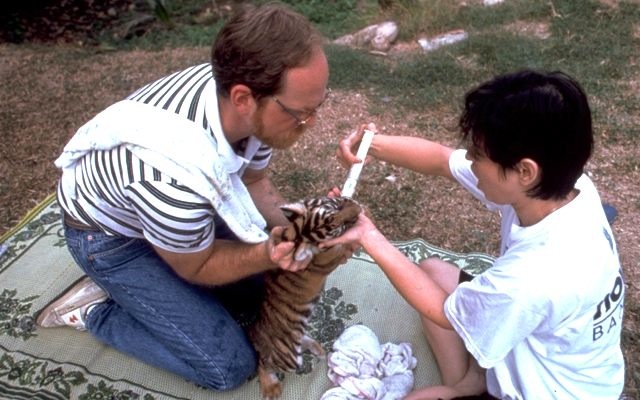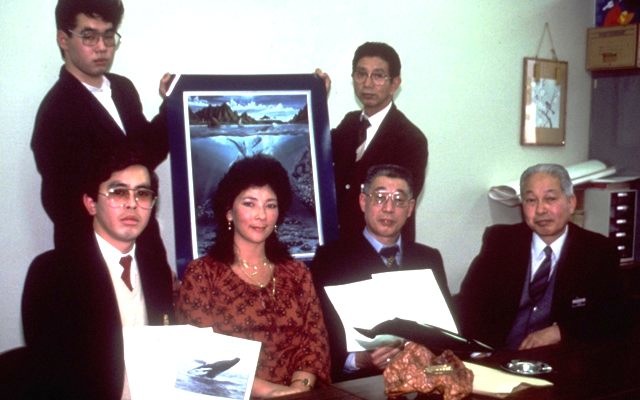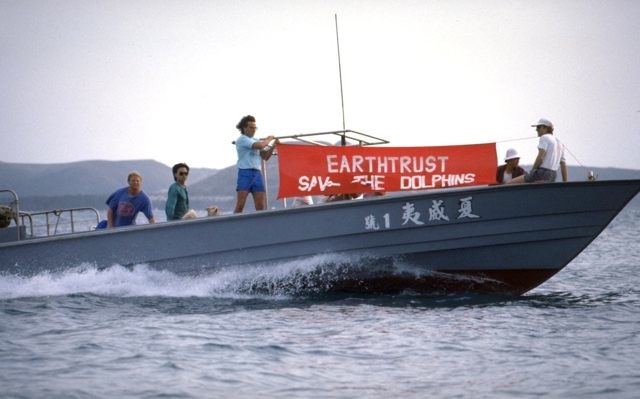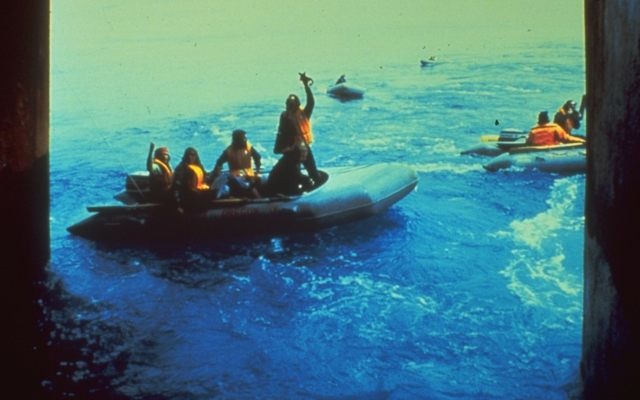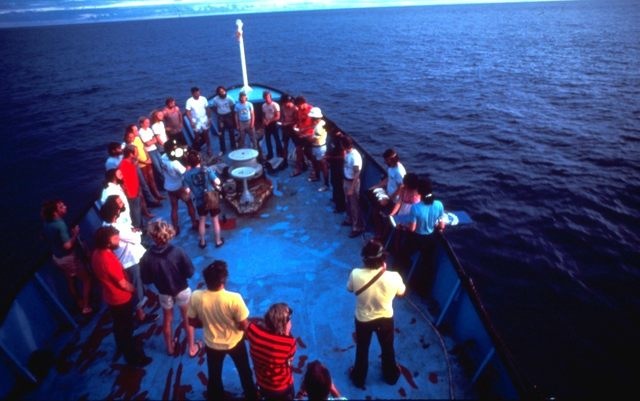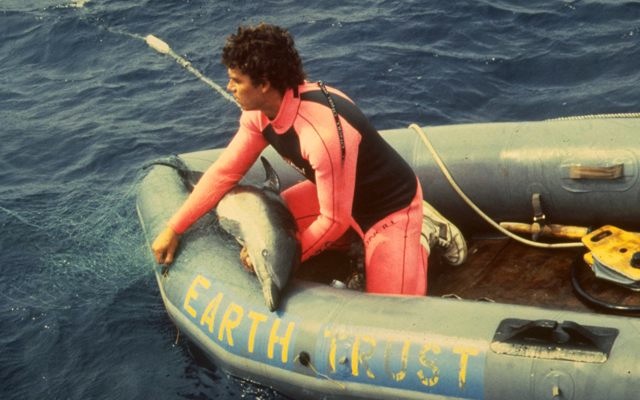Leadership
ABOUT EARTHTRUST. THE GROUP, ITS MISSION, AND THE WAYS IT’S DIFFERENT.
Hello
Click here to add your own text
Welcome to EarthTrust, the “Impossible Missions” team for environmental crises.
ET is a one-of-a-kind resource for “impossible” tasks, because its leadership analyzes issues in ways which simply wouldn’t occur to most people. This involves:
- being grounded in cross-disciplinary science for innovation
- knowing how audacious to be; how far to push beyond normal boundaries
- understanding the way complex systems interact and their effects propagate, in the abstract and in the real world
- a probabilistic framing of outcomes
- analysis of a system’s stable states, potential cascades, and phase transitions, and its overlap with systems around it
- a deep understanding of the working of the human mind, of realpolitik
- the ability to create and inject new iconic concepts into world cultures
- the chops to take advantage of chaotic situations without unreasonable fear
- the analytical awareness to often be first to an issue
- the ability to move quickly and consolidate gains before they become contaminated by other systems and actors
- the discipline to stay under the radar and control information flow until an issue can be shifted into a new state, which is increasingly how crises in today’s world must be handled.
A letter of welcome from ET’s president.
Hi, and welcome to the latest incarnation of the EarthTrust website. I hope you enjoy what you find here.
If you’ve found it through links or a ‘web search, you may wonder what you’ve stumbled onto. EarthTrust isn’t an easy group to categorize. After you get to know us, you may decide we belong in a whole new category. EarthTrust is an environmental-advocacy organization, dedicated to protecting wild species and a healthy earth, and is as activist as it’s possible to be: EarthTrust field campaigners are often in harm’s way on behalf of the earth.
ET doesn’t do “protests”; we do our best to steer reality. Typically we try to take on the “impossible” missions, and then phase out of them once our solutions become mainstream.
As you’ll see on the site, there has long been a focus on dolphins and whales, and that continues. You’ll also see that it hasn’t limited us. Our track record covers a lot of successful ground on behalf of many different issues, and the stuff highlighted in this web page is just a peek. There are rows of file cabinets full of issues ET has worked on over the years and around the world.
One thing about the Web is that you can’t tell how “big: an organization really is. For that reason, based on the stuff we do – and have done – you may get the idea that EarthTrust is one of those big environmental groups that fills your mailbox with donation requests; the ones which gross 50 or 100 million dollars per year. Not so; we merely get a high level of results. We get a lot of bang for the buck.
Moreover, I can state without fear of contradiction that you have NEVER received any junk mail from EarthTrust: we don’t do any, as a matter of principle. The costs of fundraising that way are horrendous both in trees and donated dollars. (True, we could play with the books and declare these fundraising costs “educational expenses” to make the financial statements look good, but WE would know….)
So what IS EarthTrust? As an original founder and leader of Greenpeace, I spent 10 years seeing what could be done right and wrong with a non-governmental organization wishing to help the environment. I learned to care about costs of fundraising, accountability to donors, substance over flash, science over myth. And in particular, about avoiding the pitfalls that can rob a group of credibility and effectiveness. EarthTrust, as it exists and continues evolving today, was the result.
A few concepts that seem obvious in retrospect: The real-world issues must drive the programs. The organization is only important as a tool to make programs possible. Any paid staff are part of the programs, and have no independent reason for being paid. The Board of Directors should be small and highly competent, while the list of advisors should be large and highly competent. Funds received for a project are a sacred trust, and must be held for their designated use. Waste, in fundraising or program, is not acceptable. Before a program is started, a definition of success and a workable strategy for a solution must be developed. Above all, there must be a long-term vision. Innovation is key. Science and the best technology are the favored tools. Conventional wisdom is usually out of date.
This has led to a pretty unique organization. Although EarthTrust has fielded strong offices in key locations such as Geneva, Auckland, Taipei, Los Angeles, Kuwait, and New York based on program needs, we have avoided the pitfall of keeping them open after the local program needs have been met. Although we have bought and chartered ships and planes to accomplish specific objectives, we don’t pour money into owning them between times. We don’t get much into merchandising, don’t print up calendars, don’t even publish a slick newsletter. And while our paid staff have at times numbered many dozens, this too is dependent upon programs.
This makes EarthTrust the most protean of “conservation” organizations, yet one of the most stable. And EarthTrust makes sophisticated use of “planned giving” vehicles when donors desire it: you’re probably paying money in taxes that could be saving wild species. What all this means is that EarthTrust is an efficient tool for anyone wishing to aid the whales, dolphins, or other species. Not only does $100 go as far here as $1000 goes elsewhere, but there is no “black hole” that your funds disappear into. It’s called “EarthTrust” for a reason: we absolutely honor the designations of donations, and report back to contributors.
The “down” side of these ethics and guidelines is that important projects must be “cut back” or put on hold if not funded. Program work is directly tied to funds received in a given year. (hint, hint.)
EarthTrust has seemed a bit of a well-kept secret: often in the news but never in your mailbox. This has meant, in most cases, that our supporters have been the people who have taken the time to find us, the “sophisticated donors” who know the nonprofit world and shop around to get the best “bang for the buck”. (Maybe you could think of us as sort of a discount broker for environmental progress…hmmm…)
There’s something else that distinguishes EarthTrust: the “vision thing”. It’s in being unafraid to take chances, to try new approaches. Want to make a breakthrough to the mind of a dolphin? Invent an underwater computer interface based on infra-red light beams. Need to end decades of illegal whale smuggling? Develop a new field protocol for molecular tissue identification that sidesteps legal barriers. Trying to plug the national holes in “dolphin safe” tuna schemes? Create a new international certification regime based on “Flipper” and on international contract law. Daring to expose and end the world’s largest kill of marine species? Put together a gutsy, stepwise plan and go do it.
Another thing about the structure: EarthTrust is about as close to being an electronic entity as a major conservation organization can be. It has been organized around e-mail and electronic data-stream-scanning since the early ’80’s. The physical offices adapt, the locations change, but the work and the organization go on. This presence on the ‘web adds a new dimension to the continually-evolving entity that’s EarthTrust. Nice to meet you.
DJ White, Founder and President
EarthTrust is unusual in a number of good ways.
Focus:
EarthTrust has an international focus, engaging with and frequently solving world-scale problems which have proven intractable to others. It’s regional programs can be wonderful, but they are always part of a global overview and strategy. With ET it’s “Think globally, act globally”.
Location:
EarthTrust goes where it’s needed at any given time, based on the issues it has committed to. It has had campaign offices in New York, Washington DC, San Francisco, Los Angeles, Honolulu, Taipei, Tokyo, Geneva, Auckland, and London; as well as field workers in about any country you can think of. These offices are opened and closed based on campaign logic; no office is kept open unless it is needed for one or more campaigns. It’s central administrative and executive office has always been in Kailua, Hawaii, at the home of its creator DJ White.
Philosophy:
EarthTrust is based on valuing and preserving the earth’s evolved life systems as we humans inherited them. Its methods are informed by the scientific method, and directed by pragmatism and an ethic of responsibility for the earth’s future.
This means a planet with rainforests and ice caps, seas of fish, whales and other K-type species. A planet with the biological carrying capacity and stable climate to feed a stable population of humans without wiping out other extant species.
Structure:
EarthTrust is organized electronically, and therefore not inherently limited. It doesn’t own buildings, ships, planes or other hard assets, though it rents or charters such things as needed to accomplish program goals.
The organization is literally run out of a network of electronically networked home offices, which is the most logical way to structure such an organization in the 21st century. ET pioneered this sort of structure and was written up many times in the early days of the internet, for doing impossibly cool stuff on low budgets and low overhead.
Overhead:
The overhead of the organization is ridiculously low compared with many other organizations, so low as to raise your eyebrows. Most organizations would have to cook their books to get anything like our real numbers. We have volunteer administrators, we spend next to nothing on fundraising, and there are very few fixed overhead costs. Why would anyone do it differently?
Funding Philosophy:
ET creator DJ White was also a founder of Greenpeace in the USA and internationally. His experience at the top levels of those and other groups caused him to want to do things differently with ET. Most nonprofit fundraising has extremely high costs associated with it, often high enough that the fundraising barely breaks even. For that reason, ET does not conduct mass mailings and has shut down any funding project that doesn’t produce a high percentage return, so any donations which do come in will be mostly spent on actual programs. ET has no paid fundraisers of any kind. Its philosophy is based on respect for the intelligence of its sophisticated donors, and respect for their contributions. If you aren’t inspired by our methods and our success, we don’t deserve your contribution.
Leadership:
The organization has extremely stable leadership over the years, while maintaining the ability to make quick strategic decisions and campaign pivots at the board level. The guy who created the organization in 1976 still directs it today, and his personal history coincides with a lot of environmental history being made.


